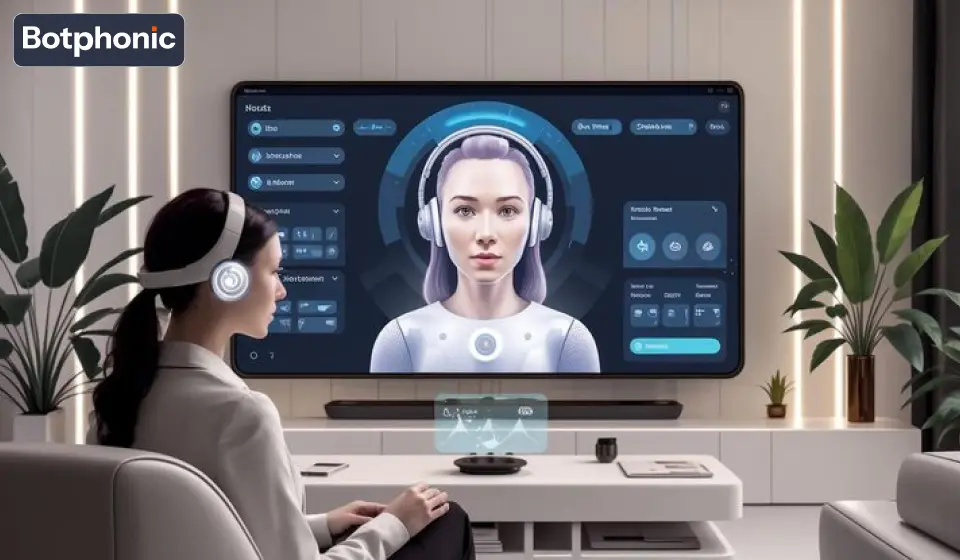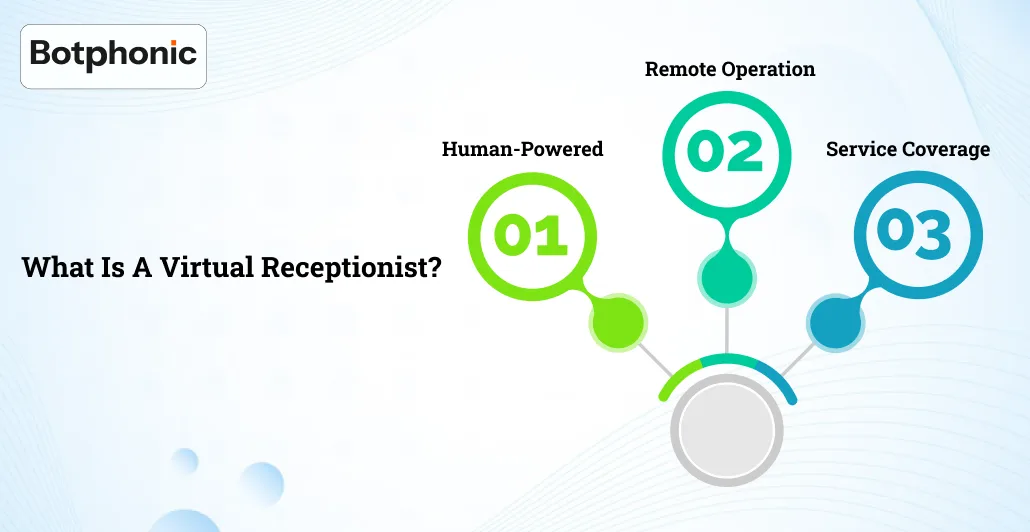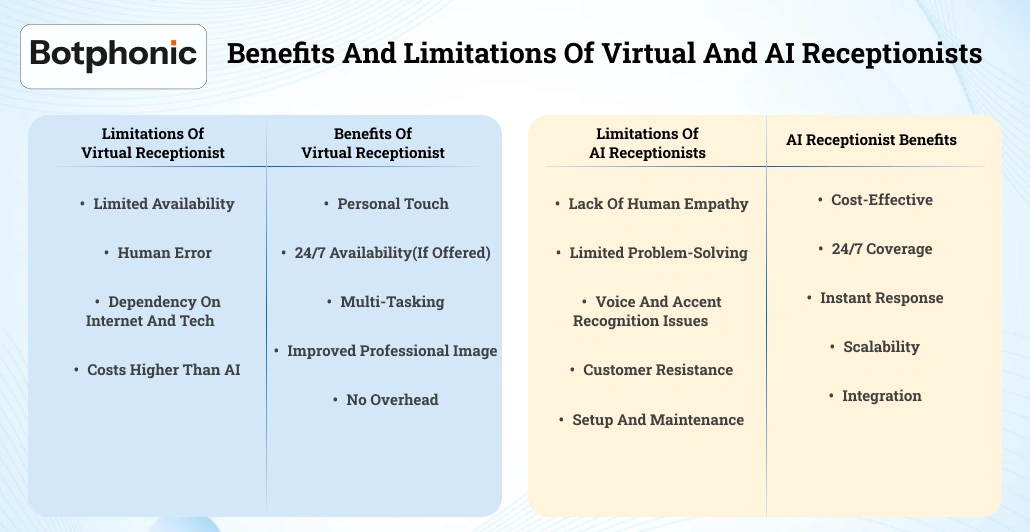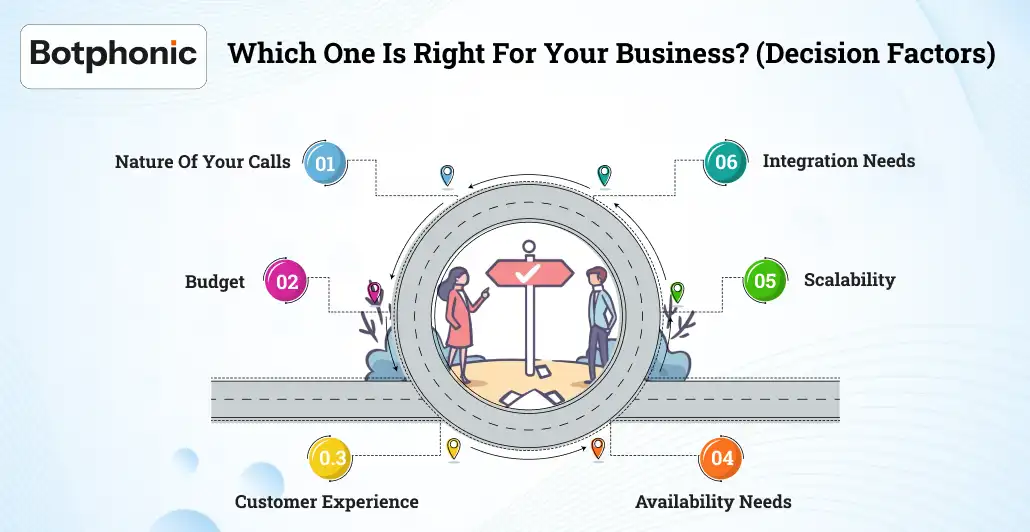
Summarize Content With:
Quick Summary
Have you ever questioned what the difference is between an AI receptionist and a virtual receptionist? Don’t worry, we are here to assist you with this question and solve all your queries related to the same. Today we will be discussing:
- What is an AI receptionist and a virtual receptionist?
- Benefits and limitation of both
- The key difference between a virtual receptionist and an AI receptionist
- A cost comparison
- The decision factor to choose the right one for you.
Introduction
Stuck between prioritising customer service with other tasks? Confused if you should opt for a virtual receptionist or an AI receptionist altogether? Don’t worry, we will help you decide by explaining to you the virtual receptionist vs AI receptionist: key differences.
Let me tell you about this in a little brief first: virtual receptionists are human receptionists who provide front-desk executive services but remotely. Whereas an AI receptionist is a software-programmed and AI-powered virtual receptionist who helps manage routine tasks with automation.
What is a Virtual Receptionist?

A virtual receptionist, a human receptionist who is not physically present but working from another place, and is providing service actively. It’s about functioning the same as an office receptionist but operating through remote devices such as phone, chat, or email. Some of the key characteristics are:
- Human-powered: A real person trained in offering customer service
- Remote operation: Works from a different location, and it might be possible that they work for more than one company
- Service coverage: Offers service during company hours; there might be some companies that can offer outside business hours too.
The common tasks covered by virtual assistants include:
- Answering and transferring calls as required.
- Attending messages and sending them through SMS or email.
- Scheduling appointments
- Managing calendars
- Sharing basic information and details
- Qualifying leads
What is an AI Receptionist?
An AI receptionist is a software-driven assistant that effectively leverages artificial intelligence, NLP, and other components, such as speech recognition, to manage tasks of a virtual receptionist. It works by automating tasks such as answering calls, routing inquiries, and even helping with appointment scheduling. The key characteristics of an AI receptionist are as follows:
- AI-powered automation: No need for a human operator; can simply work with advanced algorithms.
- 24/7 availability: Active all the time, including nights, holidays, and even on weekends.
- Integration-friendly: Can easily work while being connected with CRMs and calendars.
- Scalable: Able to handle hundreds of calls at once without getting tired.
Some of the common tasks covered by an AI receptionist are:
- Answers and routes calls using keypad or voice options.
- Schedules an appointment and sends confirmation.
- Collects all the details received from the caller.
- Provides uniform and sustainable information from a pre-added database.
Benefits and Limitations of Virtual and AI Receptionists

Now that we know about virtual assistants and AI receptionists, let’s read more about their benefits and limitations.
Let’s start with virtual receptionists, who are human-based and remote receptionists.
Limitations of Virtual Receptionist
- Limited Availability: Even though these are virtual receptionists, they don’t often provide 24/7 coverage.
- Human Error: These receptionists are prone to error as humans are bound to make little error or can even lead to miscommunication.
- Dependency on Internet and Tech: If there are certain discrepancies in internet or device it can affect the service.
- Costs Higher Than AI: Even though these virtual receptionists can cost less than in-house employees, ongoing service can still add up and might cost higher than AI.
Benefits of Virtual Receptionist
- Personal Touch: Effectively offers an ounce of human empathy and conversational nuance that might lead to increased customer satisfaction.
- 24/7 Availability(if offered): Several services offer 24/7 help.
- Multi-tasking: Can easily handle complex inquiries, scheduling, and follow-ups too.
- Improved Professional Image: Helps make a polished and customer-friendly presence of brand, even if they are small scale.
- No Overhead: Adding virtual receptionists to the team, allows the no need of physical office space, any equipment, or even full-time salary.
After knowing the limitations and benefits of virtual receptionists, I am sure you all might be eager to know about AI receptionists too. But would you like to know tell us, what do you think is better AI receptionist or virtual receptionist? Obviously, it’s subjective but do let us know who do you think is better and why??
Let’s get into it and know the limitations and benefits of an AI receptionist.
Limitations of AI Receptionists
- Lack of Human Empathy: Even though AI receptionists can offer convenient and instant solutions, it lacks human empathy which is important for solving complex queries.
- Limited Problem-Solving: Due to lack of human empathy and complex queries, it struggles with complex and nuanced issues.
- Voice and Accent Recognition Issues: There might be some situation when AI may misinterpret callers with different accent or background noise.
- Customer Resistance: Numerous clients don’t prefer talking with a machine.
- Setup and Maintenance: Might require proper configuration of the setup and updates to remain effective.
AI Receptionist Benefits
- Cost-Effective: With one-time or subscription-based costs, it’s usually cheaper than human receptionists.
- 24/7 Coverage: AI receptionists don’t require breaks or holidays.
- Instant Response: Escalates call effectively and shares easy access to information.
- Scalability: Can scale as per the call volume.
- Integration: AI receptionists integrate provide easy access and can easily sync with CRM, calendars, and other systems.
Now that we have told you about the limitations and benefits of AI receptionists, how about we also get into ideal use cases of the same? Let’s get into it.
Ideal Use Case
- Virtual Receptionist: Businesses who need personal interaction and complex hand calling can opt for a virtual receptionist.
- AI Receptionist: For high-volume calls, and routine tasks AI receptionist can be chosen without any difficulty as it’s a cost-efficient solution along with its 24/7 coverage.
Virtual Receptionist vs AI Receptionist: Key Differences
And now we know the limitations and benefits of our beloved virtual receptionist and AI receptionist too, let’s start with key differences between them to get more clarity between them.
For Virtual Receptionist:
- Nature of Service: A real person is working remotely to manage calls and other required tasks.
- Interaction Quality: Effectively offers human empathy, tone, and nuanced conversations.
- Availability: Usually available during business hours, though some selective agencies offer 24/7 coverage.
- Cost: Due to human labor requires higher recurring costs.
- Scalability: Limited due to the number of hired employees and human- agents availability.
- Complexity Handling: Able to manage complex queries and sensitive situations effectively.
- Integration: Can integrate with calendars and CRMs manually.
- Customer Perception: Is considered professional and personal while talking.
- Error Risk: Prone to human error, such as mishearing, typos, miscommunications, etc.
For AI Receptionist:
- Nature of Service: An automated system which is software driven and powered by AI.
- Interaction Quality: Usually lacks true intelligence and relies heavily on pre-added data during training.
- Availability: AI call assistant is always available and provides easy 24/7 availability.
- Cost: Offers lower long-term cost, as it offers with subscription or one-time plan.
- Scalability: Can easily manage large volumes of calls, at once.
- Complexity Handling: Best for handling simple and repetitive tasks.
- Integration: Provides seamless integrations with required digital platforms.
- Customer Perception: A few of the customers might feel frustrated and impersonal, if the responses are limited and repetitive.
- Error Risk: Errors might occur due to voice recognition issues, system bugs, or even due to language barriers(if multilingual model is not supported)
A comparison table for clarity:
| Feature | Virtual Receptionist | AI Receptionist |
| Nature of Service | Human-based, remote receptionist | Software-driven, automated system |
| Interaction Quality | Human empathy, natural conversation | Limited emotional intelligence, scripted |
| Availability | Business hours or extended hours | 24/7, no breaks |
| Cost | Higher recurring cost | Lower long-term cost |
| Scalability | Limited by human staff | Highly scalable, handles many calls |
| Complexity Handling | Great for complex issues & nuances | Best for simple, repetitive tasks |
| Integration | Manual integration with systems | Seamless integration with CRM & tools |
| Customer Perception | Personal and professional | Can feel impersonal or robotic |
| Error Risk | Human error possible | AI recognition errors possible |
Cost Comparison: Which One Saves More?
Hiring a virtual receptionist can cost you not just about the salary but also gives you less advantage in features if compared to an AI receptionist. However, they both have their pros and cons that we read earlier about the difference between their cost is absolutely significant
Let’s start with the cost comparison between virtual receptionist and AI receptionist:
Virtual Receptionist
A human virtual receptionist can cost $250-$1000 salary per month, or some may offer a per-minute charge ranging from $0.75 to $0.1.50 per minute.
AI Receptionist
There are numerous AI platforms that starts the basic range from $25-$200 and goes to premium range that goes upto $1500 per month.
Even though there are platforms offering such a high range for their AI receptionist tool, Botphonic is an affordable AI receptionist, which offers ranges that can be even suitable for small-scale business starting their basic plan with $22 per month.
Save time, cut costs, and never miss a lead, upgrade to an AI receptionist today!
Explore AI Receptionists!!Which One is Right for Your Business? (Decision Factors)

For choosing the right one as per your business requirements it’s necessary to assess all the factors and then opt for one. Don’t worry we will not be letting you out here thinking alone, we are going to share some of the decision factor criteria for you to choose:
1. Nature of Your Calls
- If you are in the business where your call details can be complex and sensitive you should opt for virtual receptionists.
- Opt for AI receptionist service if it’s simple and high volume calls, such as answering FAQs or sharing basic info.
2. Budget
- Having a tight budget and wanting to opt for a cost-driven option, choose an AI receptionist as it starts as low as $22 a month.
- I want to be quality focused and share a personalized experience to each with human empathy. Go for a virtual receptionist.
3. Customer Experience
- Wants to give your customer a personalized experience and thinks human touch is important for the same, choose a virtual receptionist without any hesitation.
- Your customers are tech lovers and have no problem with automation, freely opt for AI call receptionists then.
4. Availability Needs
- Wants to offer services as per customers need, whether it’s midnight or even a weekend, choose AI receptionist, as it offers services without any extra costs.
- Only looking to provide services in business hours, virtual receptionists are for you.
5. Scalability
- Needs instant scalability, without any additional budget, AI receptionists are going to.
- If you want to have moderate call flow, the virtual receptionist will handle calls well then.
6. Integration Needs
- Want to use automation, and heavy integration is needed with CRM? Go for an AI receptionist.
- Value personal follow-up and manual processes? Virtual receptionists are great for custom handling.
Quick Recommendation Matrix
| Factor | Best Choice |
| Complex, sensitive calls | Virtual Receptionist |
| High call volume, repetitive | AI Receptionist |
| Low budget | AI Receptionist |
| Human touch & empathy | Virtual Receptionist |
| 24/7 availability | AI Receptionist |
| Scalable growth | AI Receptionist |
Conclusion
Still confused which is better, don’t be like this you might have obviously selected your go to option to escalate your businesses’ growth. Virtual receptionist is for you only if you want to offer services in a selective manner and that too in business hours. Also as we already read it’s not so cost-efficient so as far as we’d love virtual receptionists to get optimized beautifully, it might not be for small businesses. Whereas, AI virtual receptionist small business are cost-efficient and are also capable of offering personalized experience.
Just because there is a lack of empathy it doesn’t mean that AI is not able to share personalized experiences. The best AI receptionist software are there for you to escalate and enhance your operational efficiency too.

